I recently watched Motherland, a documentary that was nothing short of transformative for me—a sweeping, cinematic journey through the African continent that centers African perspectives, knowledge, and skills. As someone deeply committed to showcasing cultural pride, identity, and the stories that shape us, I feel compelled to bring this experience to you, my readers, in the most intimate, first-person way.
In this blog post, I’ll walk you through the documentary’s moving portrayal of Africa’s past, present, and future, infused with African wisdom and creative mastery. I’ll share how it challenged my preconceptions, energized my spirit, and deepened my appreciation for our collective legacy. For those searching for insights on African history, Pan-African unity, or the power of narrative storytelling—this is for you.
What Motherland Made Me Realize
When the opening frames of Motherland started, I felt something immediately shift inside me. The film is directed by Owen ‘Alik Shahadah, and it bravely places African people at the center of their own story—from Ancient Egypt to today’s Africa, unflinchingly and unapologetically reclaiming the narrative WikipediaFilms and Festivals.
What struck me most was that this wasn’t a history from the outside; this was our story told by us. The visuals pulse with pride, dignity, and an unapologetic call for African unity, self-determination, and rebirth Films and Festivals. That energy flowed through how it captured the continent’s majesty—its ancient civilizations, its political power, its creative voices.
The cast reads like a who’s who of African heritage and leadership—Meles Zenawi, Jacob Zuma, Molefi Kete Asante, Maulana Karenga, even Harry Belafonte—they lend gravitas to the narrative, each representing a thread in the Pan-African tapestry WikipediaFilms and Festivals. I was transported from the pyramids of Egypt through South African townships, Ghanaian drum circles, Ethiopian plateaus—every frame looked like a living celebration of African genius. The film spans from the continent’s ancient roots to the present, mapping how history, culture, politics, and contemporary issues intertwine WikipediaAmazon
I wrote this blog to pass on the same goosebumps I felt—from the film’s bold visuals to its refusal to sanitize the real present, to its insistence that African people own and define their identity.
The Cultural Power of Music
Beyond the images, it’s the soundtrack that burrowed into my soul. Composed by Sona Jobarteh, a Gambian multi-instrumentalist from a griot lineage, the score is an innovative fusion of tradition and cinematic vision Wikipedia.
Jobarteh didn’t just use African instruments—she reinvented them. She turned the kora into a bass instrument, retuned it to Arabic scales, and even invented a new instrument called the nkoni (a hybrid of kora and Donso ngoni) to broaden the sonic palette Wikipedia. Her voice carries the weight of history, yet feels refreshingly modern.
Listening, I could feel ancestral rhythms dancing through my heart, weaving threads from centuries into the present. It wasn’t just music—it was centuries of memory, unearthed and reimagined. That score alone made me want to dig deeper into West African musical traditions and think about how we can re-centre indigenous sound in contemporary media.
Motherland is the most powerful documentary on Africa. Fusing history, culture, politics, and contemporary issues, Motherland sweeps across Africa to tell a new story of a dynamic continent. From the glory and majesty of Africa’s past through its complex history. Africa as you have never seen it. From multi-award-winning director Alik Shahadah (500 Years Later.)

Themes That Echoed Deeply
1. Reclaiming the Narrative
For too long, Africa’s stories were told by others—filtered through colonial and outsider lenses. Motherland instead turns the camera back, offering a self-determined story of Africa’s glory, pain, resilience, and rebirth. Films and Festivals. Watching it, I felt something shift in me. I realized the importance of amplifying voices from within.
2. Unity in Diversity
The documentary doesn’t shy away from Africa’s vastness. From Ancient Egypt to modern political leaders, from cultural philosophy to grassroots art—it shows that our unity doesn’t erase diversity. Instead, it elevates it. I felt proud, connected, and energized.
3. Continuity: Past Meets Present
This isn’t nostalgia. This is a celebration of continuity—of how ancient wisdom informs today’s struggles and triumphs. That arc of history running through the film made me want to learn more about African philosophy, Pan-Africanism, and the echoes of civilizational memory in today’s movements.
4. Creative Power as Resistance
The artistry in Motherland—from visual composition to music to narrative structure—is resistance. Creating beauty out of surviving, thriving through storytelling. It inspired me to think about my own creative expressions—not just as art, but as acts of liberation.
Insights I’m Taking Forward
- Visibility matters—seeing our stories portrayed with dignity fuels pride, and pride inspires action.
- Storytelling is healing—narratives shape how we understand ourselves; decolonized narratives can help mend generational wounds.
- Art carries memory—through music, imagery, and words, creative mediums become vessels for history.
- We are connected—across time, space, and struggle—and this film reminds us of our shared heritage and destiny.
If you haven’t yet watched Motherland, make space for it. Let it move you as it moved me. And to my fellow creators and educators—let’s commit to telling our own stories, centering African perspectives, and honoring our complexity with creativity.
Comment below: what part of this resonated most with you? The visuals? The voices? The score? I’d love to hear your reflections, and perhaps we can build a reading or screening group together.
Motherland is more than a documentary—it’s a clarion call. It calls us to remember our roots, claim our stories, and create with purpose. Watching it was like drinking from a river of centuries: vast, powerful, and life-nourishing.
This is more than a film review; it’s a personal manifesto, sparked by art that sees me, all of us, clearly and beautifully.
Please donate to help me continue building and make this site an information center for all
Donate via Cash App
